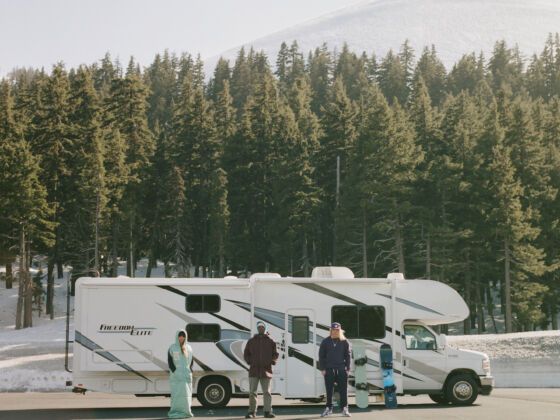My family and I thought we had the travel routine locked down: book a cabin in the mountains, spend hundreds of dollars, and pack the car to the brim.
Then, when our boys were 11 and 14 — the perfect age for camping, skiing, boarding, biking, or whatever activity the terrain and season allowed — we rented an RV for two weeks.
We were hooked.
After that trip, we ran to buy a mid-priced travel trailer and never looked back. Everyone and everything had its own space. We got to travel more often and stay longer for the same spend. We hauled bikes, kayaks, and boards around mountain parks and river valleys. We fished, skied, biked, hiked, and snowboarded — wherever the boys wanted to go. We upgraded to a four-season-capable trailer, pushing our camping season into the frosty days on both ends of the calendar.
Yes, backwoods cabins are great, but RVs are simply better for pursuing adventure sports year-round. They’re the ultimate rolling launch pad — a home stocked with all your favorite gear and a cozy respite at the base of your favorite mountain. Rain or shine, sun or snow, all you need to do is outfit your RV and go. Here’s how.
Get your rig right.
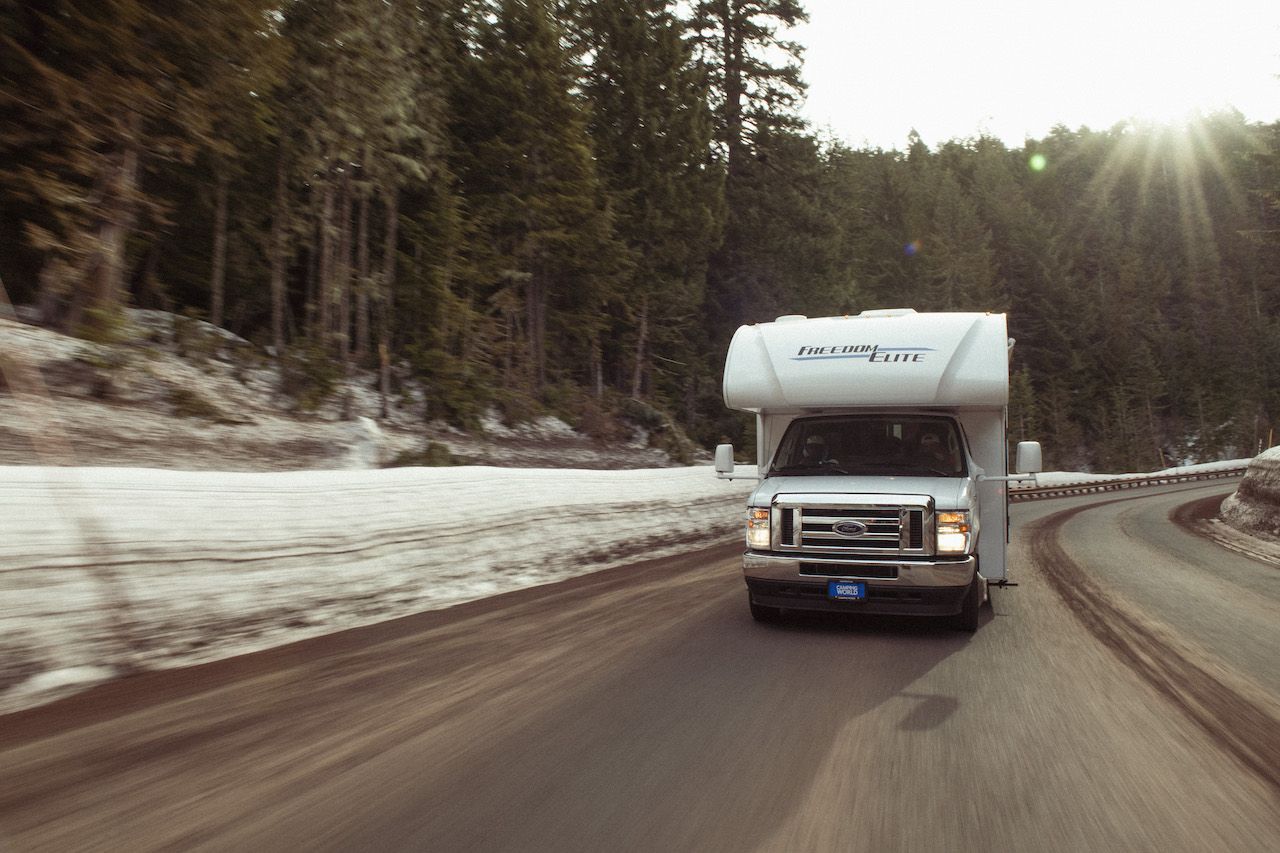
Photo: Andrew Peters
First tip: Hit up the folks at your nearest Camping World. They’ll help you choose the right RV for your situation and will walk you through the dealer-installed options you’ll want to add to your new mobile basecamp. You can get all kinds of add-ons — think solar prep for silent off-grid camping, off-road tires for backroad driving, roof racks and rear racks to haul all your gear, etc. Simply put, don’t leave the dealer without getting your basecamp kitted out for your adventures.
Everyone has different needs, but here’s what we did to set up our RV for all seasons. We switched out the standard RV battery for two 6-volt truck batteries hooked up in series, which gives us up to seven days of off-grid power on a single charge. We also added a decent solar panel to the roof — it charges the batteries to 100% by mid-afternoon during the long summer days.
Knowing we wanted winter capabilities as well, the trailer we selected is designed with enhanced insulation in the walls, ceiling, floors, and windows. The wastewater and freshwater tanks are wired for optional heating, and the hot air from the forced-air furnace circulates around the tanks. We regularly dry camp comfortably in a few degrees of frost — if you opt to install these features, you can too.
Regardless of whether you go the towable or motorhome route, keep your RV outfitted with season-appropriate tires with lots of tread, suitable for wherever your travels may take you. And with that, you’re almost ready to go wherever, whenever. Next up?
Get your setup right.
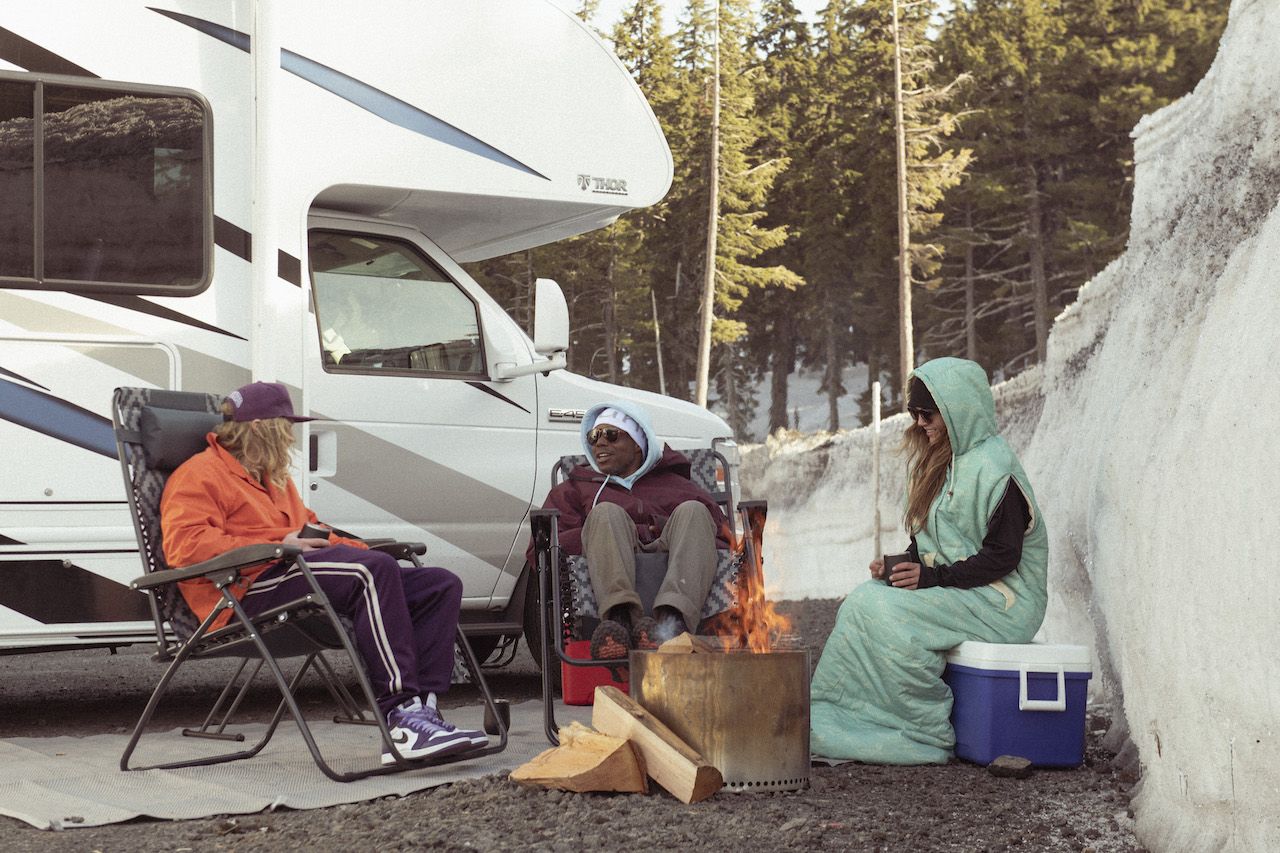
Photo: Andrew Peters
Some of the best, most scenic campsites have no power. While our solar panel charges our batteries just fine, we need power to run the hairdryer and the toaster, so we bring along a generator to supplement as needed. Our Honda generator is 20 years old — proof you don’t always need the newest model! — and I chose it for its bulletproof reputation as the quietest gen on the market. (Quiet becomes more important the longer you run it, and it’s a requirement in national parks that have decibel restrictions.)
A dealer-installed rack or carrier for the trailer was critical for us. We haul mountain bikes, and I can move the rack to the truck for local day trips. My ancient Thule cartop carrier rides above the cab and holds additional gear like bike helmets, fly fishing tackle, skis, and snowboards.
After a day of pounding trails or rafting whitewater, relaxing in my favorite chair by the fire feels like my own personal spa. Don’t scrimp on this one — get a chair that pampers you. Mine is zero-gravity, well-padded, and reclines to just the right position. I keep a closed-cell foam sleeping pad as a liner to reflect my body heat when it’s chilly, making it extra comfy. And while everyone prefers a real crackling and roaring fire, portable fires are the only option when there’s a fire ban.
When you’re nowhere near civilization — or even when you are — take this spot by the fire and turn it into your own après surf/ski/downhill hangout with patio lanterns, the right canopy, and all the decorative accoutrements you can think of. This is your home, watering hole, and personal refuge on wheels after all.
Be prepared, smart, and a bit fearless.
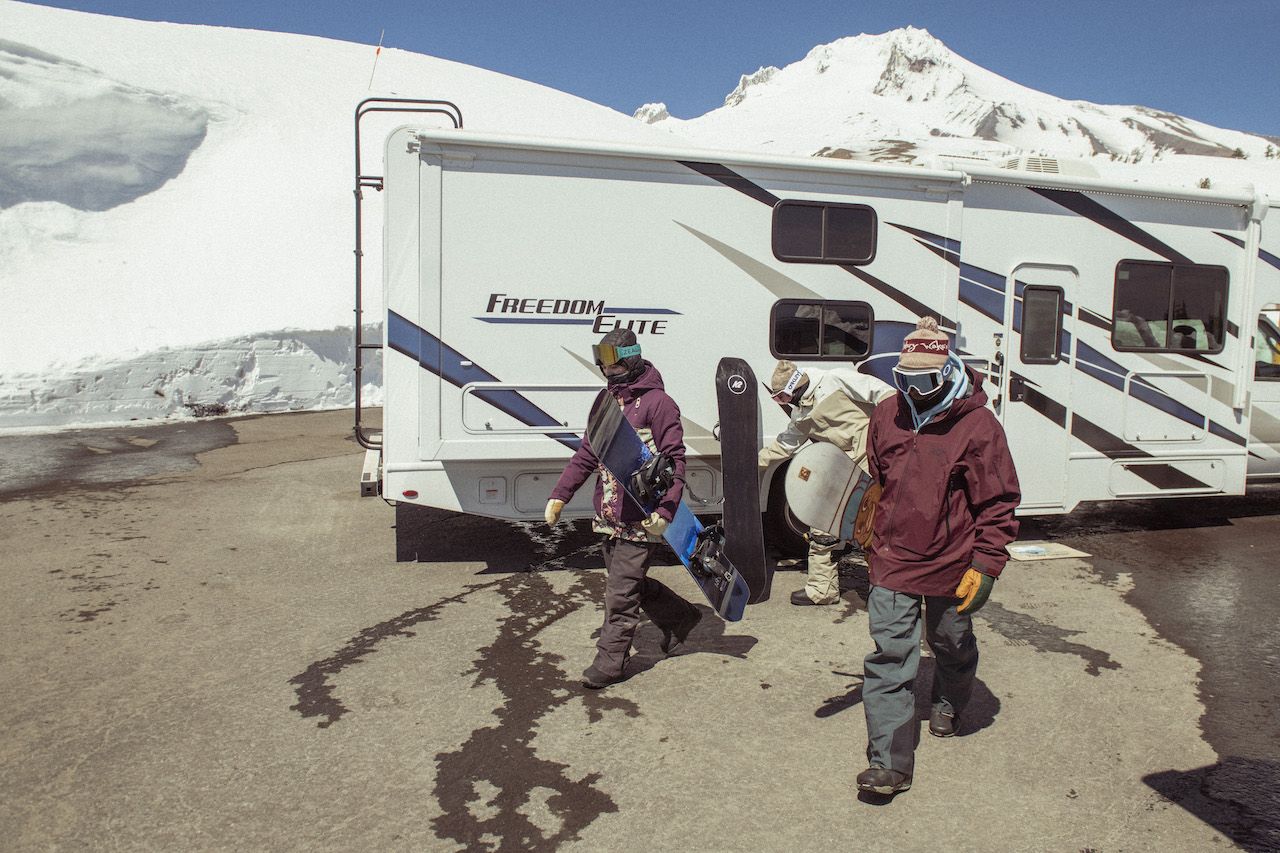
Photo: Andrew Peters
Driving, backing up, and parking your RV are crucial skills only developed by doing. Empty school parking lots are great places to practice that maneuvering — which should include working out your hand-signal communication with your spotter. There’s nothing as impressive as a big shiny rig rolling up to the campsite and the driver and spotter quietly and efficiently getting it parked.
Once you’re finally on the road, it’s all about thinking ahead. Remember you’ll need extra time to get up to cruising speed, and passing other vehicles often won’t be an option. You’ll need to be dialed into the weather for today and tomorrow. Make your favorite weather app your trusty sidekick, and always combine Google Maps with an old-school atlas. Large broadsheet maps will help you envision the space you’re traveling through better than your tiny mobile phone screen, and they never require wifi or cell service.
Thinking ahead goes double for winter RVing, as you need to protect against the specter of frozen waterlines. If there’s a week-long cold snap coming during a trip, we’ll drain the tanks and winterize. I carry the tools I need with me, and in 30 minutes, all my water and wastewater is drained; the waterlines, taps, and sink drain all have antifreeze in them. But that doesn’t mean we have to head home! We fearlessly dry camp even in temperatures well below zero with nothing but a five-gallon water jug and a plastic bucket that fits in the sink for washing dishes and collecting water. You can almost always make it work.
Ask your dealer to walk you through how to winterize your particular model. In addition to providing any additional gear you’ll need, they’ll show you just how simple the process can be.
Find the right spot for your adventures.
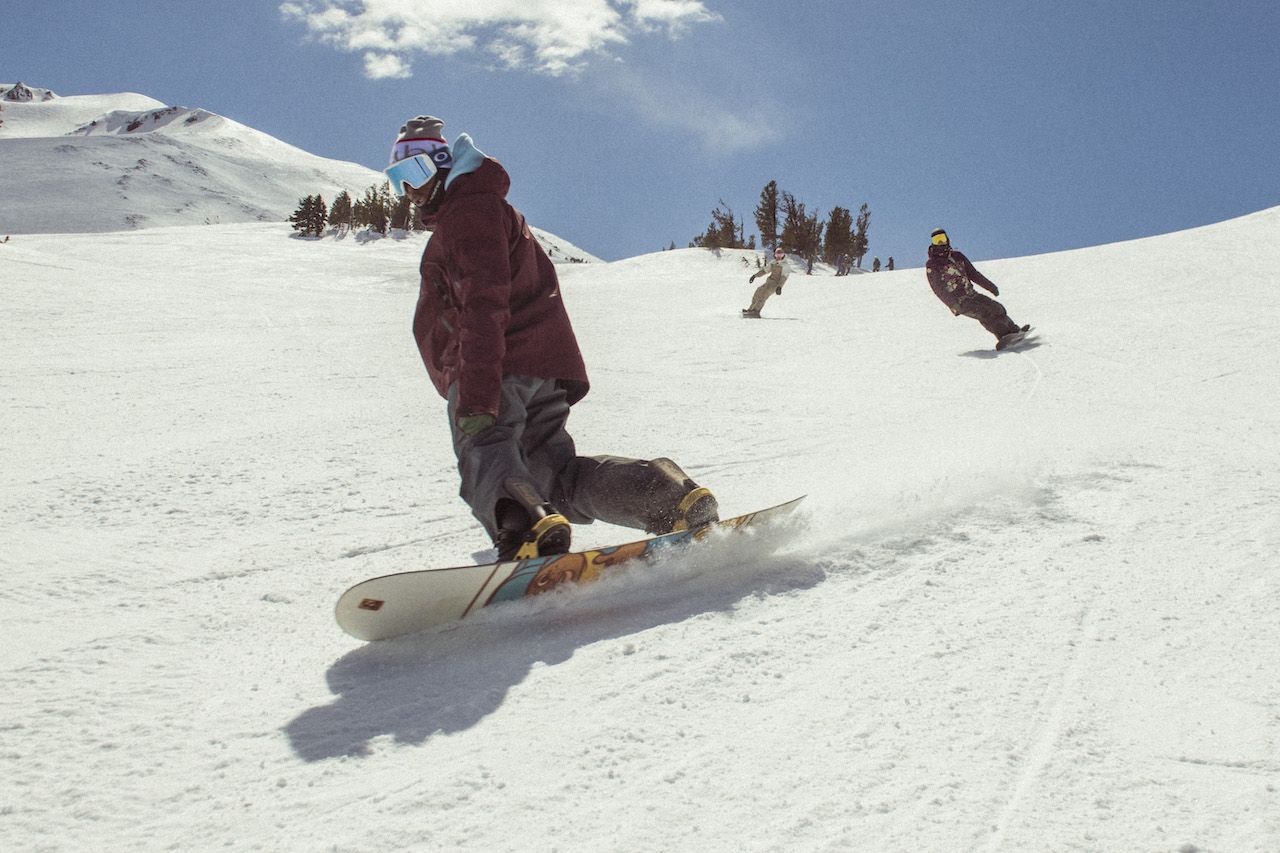
Photo: Andrew Peters
A good camping spot gives you what you want in addition to what you need. Some folks look for full hookups and easy access to civilization. Others prefer wide-open spaces and come prepared for solitude with solar power, stored water, and a generator to boondock. Whatever your camping style, here are a few spots I’ve found that are hard to beat in terms of their opportunities for adventure nearby:
- Whistler-Blackcomb is one of the few places in North America where you can summer snowboard in the morning and downhill bike in the afternoon. The local Riverside Camping & Resort is set up for properly heated hookups for winter camping, so you can extend your season to full year-round.
- Rock climbing in Idaho is world-class. Boise RV Park is a great place to call home for a few days while you explore the granite playgrounds outside the capital.
- Central Oregon mountain biking trails run for some 900 miles. There are plenty of regional campgrounds with all the amenities you’re looking for — head to the Bend area and you can’t go wrong.
- Lake Shasta, just north of Redding, California, is an excellent spot to wakeboard, and Durango RV Resorts will make your basecamp an extra comfortable one.
Honestly, it doesn’t matter where you go — just that you do. Once you commit to RVing, the freedom to roam will hook you. With your own backcountry cabin on wheels along for the adventure, you’ll do more of what you want with access to more places and more fun. See you out there on the road, or under those patio lanterns.

